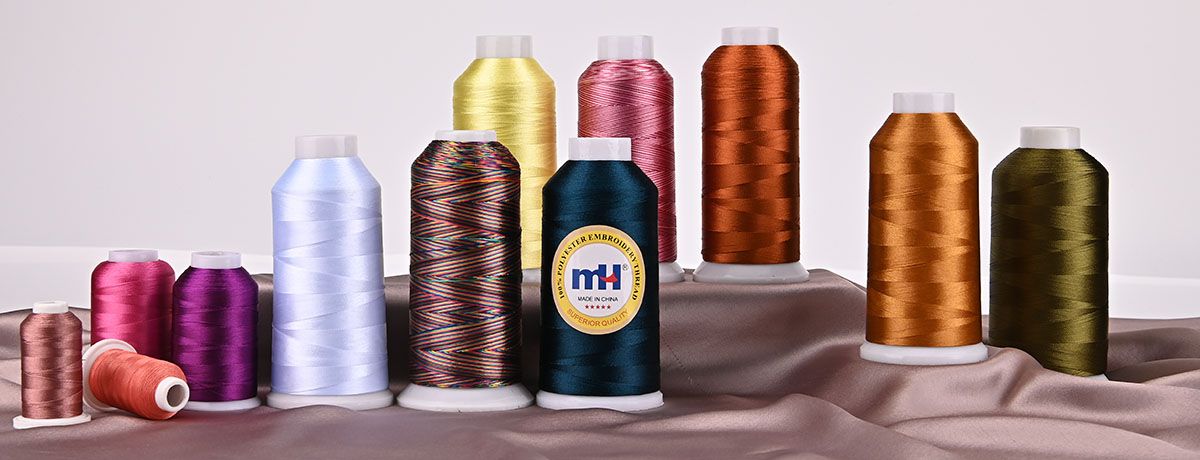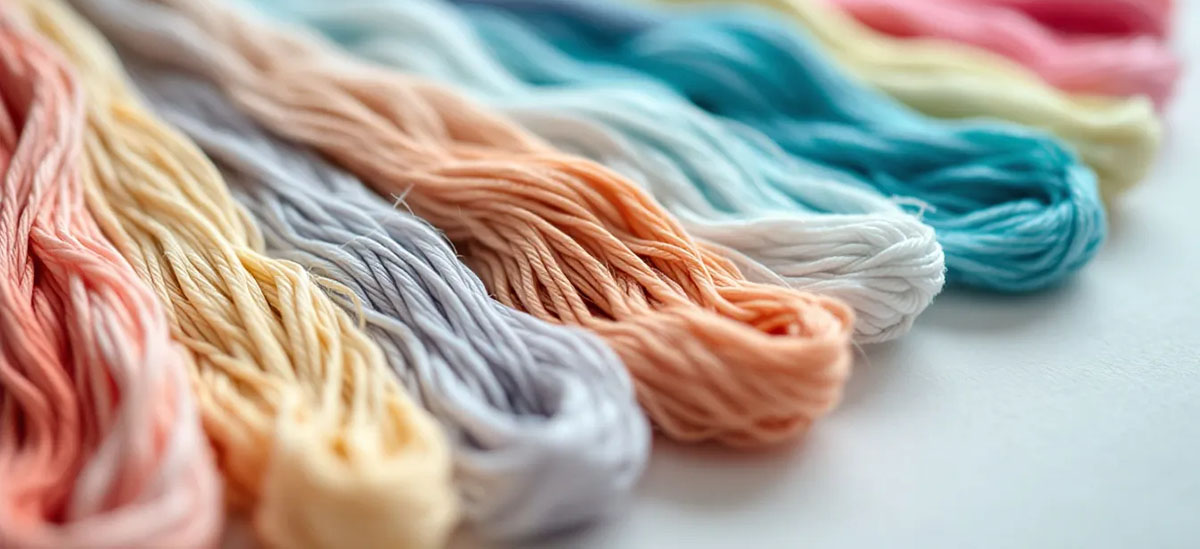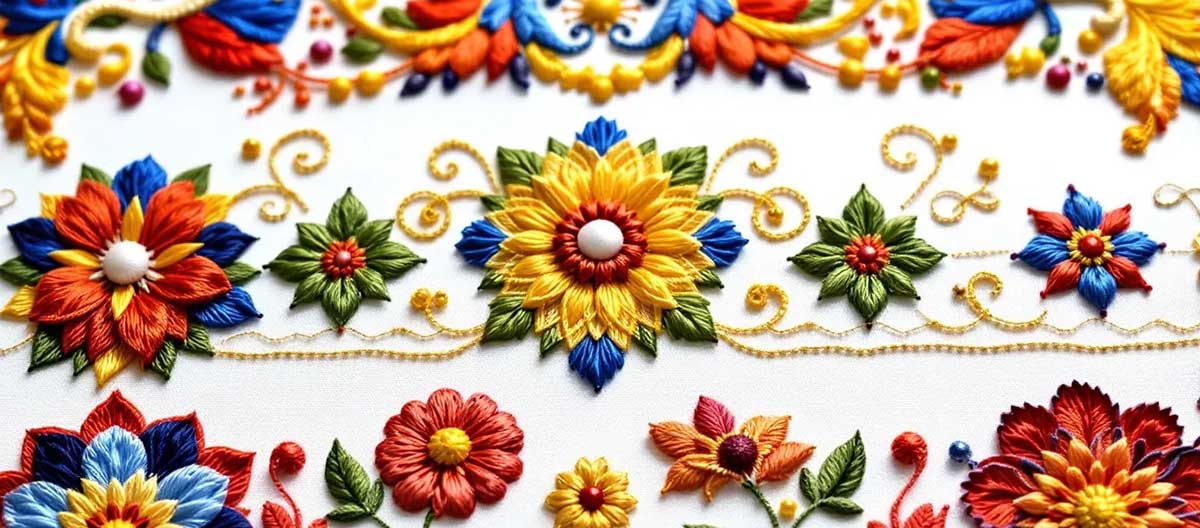The Best Types of Embroidery Threads for Every Project

- Key Takeaways
- Types of Embroidery Threads
- Polyester vs. Rayon Threads
- Cotton Embroidery Threads
- Specialty Threads
- Key Features of High-Quality Embroidery Threads
- Choosing the Right Thread for Your Project
- Bulk Orders and OEM/ODM Production
- Applications of Embroidery Threads
- Tips for Handling Embroidery Threads
- Summary
- Frequently Asked Questions
Embroidery threads vary widely, offering distinct advantages for different projects. This guide covers the main types and their uses.
Key Takeaways
-
Different types of embroidery threads, like cotton, silk, and rayon, offer unique textures and effects, allowing you to tailor your projects for the perfect finish.
-
Choosing between polyester and rayon threads depends on your project needs, with rayon providing a luxurious feel while polyester ensures durability.
-
High-quality embroidery threads enhance the longevity and look of your work, featuring key characteristics like colorfastness and tensile strength to deliver outstanding results.
Types of Embroidery Threads
Embroidery threads can be categorized by material, each bringing its own texture and visual appeal to your creations. Some of the most common materials include:
-
Cotton
-
Silk
-
Rayon
-
Linen
-
Wool
-
Various synthetic options
Among these, stranded cotton is a favorite for its versatility. Comprising six separable twisted strand, it allows for customizable thickness and weight, making it perfect for both bold and delicate detailing. Stranded cotton threads are available in a wide range of dyed colors, including specialty dyed variations created by companies and individual dyers for unique effects.
Beyond stranded cotton, there are other popular choices like:
-
Ribbon embroidery, which uses silk ribbons to create lifelike floral designs with a textured appearance.
-
Cotton Perle thread, known for its lustrous finish and non-divisibility, available in various weights to add texture to your stitching.
-
Floche, another non-divisible cotton thread, mercerized to give a gentle sheen, making it ideal for intricate embroidery work.
White cotton threads are especially suitable for whitework and heirloom embroidery techniques, thanks to their color, finish, and suitability for delicate stitching.
For those who prefer a softer color palette, Danish Flower Thread offers unmercerized cotton with subtle shading, perfect for natural fibers. Crewel wool threads, typically 2-ply, are used for canvas work and crewel embroidery, providing a range of hues to choose from. Given the wide variety of threads available, you can tailor your choice to the specific needs of your project, ensuring the perfect finish every time.
Polyester vs. Rayon Threads
When it comes to machine embroidery, the choice between polyester and rayon threads often comes down to the specific needs of your project. Rayon embroidery thread, derived from regenerated cellulose, is known for its glossy finish and smooth texture, which enhances the visual effects of your embroidery. Its natural softness and lustrous finish make rayon a popular choice for projects that require a luxurious feel.
In contrast, polyester is a synthetic fiber renowned for its strength and durability. Resistant to chemicals and abrasion, polyester threads are ideal for projects that will be subjected to frequent use and exposure to moisture. This makes them particularly suitable for items like uniforms and outdoor gear, where durability is paramount.
While rayon threads provide a softer, more flexible fabric, polyester threads create a stiffer finish due to their rougher texture. Each type of thread has its own unique properties, making them suitable for different applications. Understanding these differences helps you choose the right thread to achieve the desired look and durability for your embroidery projects.
Cotton Embroidery Threads

Cotton embroidery threads are cherished for their softness and natural feel, making them comfortable to work with for extended periods. Sashiko thread, a robust non-divisible cotton, is traditionally used in Japanese quilting and visible mending projects, adding both strength and beauty. Floche, another non-divisible cotton with a gentle sheen, is ideal for techniques like monograms and satin stitches, offering a refined finish.
White cotton threads are especially prized for whitework and heirloom stitching, thanks to their clean color and soft finish.
The versatility of cotton threads makes them suitable for a variety of hand embroidery techniques. Their natural finish and ease of use make them perfect for projects where a soft and natural look is desired. Whether you’re embroidering a delicate monogram or creating a bold quilting design, cotton threads provide the perfect balance of durability and aesthetic appeal.
Specialty Threads
Specialty threads open up a world of creative possibilities, each bringing a unique texture and effect to your embroidery. Metallic threads, composed of polyester, have the following characteristics:
-
Come in various weights
-
Often incorporate reflective materials
-
Are perfect for projects requiring a shiny or glittery effect
-
Can add a touch of glamour
-
Require careful handling to prevent fraying and tangling
Variegated threads, featuring multiple color changes along their length, enable the creation of natural gradients in embroidery designs. These dynamic color transitions allow for intricate patterns without the need for multiple thread changes, adding depth and visual interest to your work.
Novelty threads, such as glow-in-the-dark or overdyed options, further enhance the creative possibilities in embroidery. Specialty dyed threads, including overdyed and hand-dyed variations, offer unique color effects that can dramatically enhance the visual appeal of your embroidery projects. These dyed threads are available from various brands and individual dyers, providing a wide range of colors and finishes. The unique composition of specialty threads can influence their compatibility with different stitching techniques and machines, so it’s important to choose the right type for your specific needs.
Key Features of High-Quality Embroidery Threads
High-quality embroidery threads possess several key features that contribute to the longevity and overall appearance of your projects. Colorfastness, the ability of a thread to maintain its color after washing or exposure to sunlight, is crucial for ensuring your embroidery stays vibrant over time. Another important feature is tensile strength, which measures how much force a thread can withstand before breaking, ensuring durability in both machine and hand embroidery.
High-quality embroidery threads have the following characteristics:
-
A smooth finish that reduces friction during stitching, preventing breakage and ensuring even application.
-
Consistent thickness and twist that contribute to uniform stitching and a polished overall appearance.
-
Resistance to abrasion, making them suitable for items that will undergo frequent washing and everyday use.
MH’s embroidery threads, known for their bright colors, high tensile strength, smooth finish, and excellent colorfast, exemplify these qualities.
Choosing the Right Thread for Your Project
Choosing the right thread is essential for achieving the desired effect in your embroidery project. Thread thickness greatly influences the visual impact; thicker threads create bold designs, while finer threads are ideal for intricate details. The thread finish, whether matte, satin, or glossy, can significantly change the final look of your embroidery.
Durability is vital. Stronger threads, like polyester, are ideal for items subjected to regular use or washing, ensuring your embroidery remains intact over time. Considering the amount of thread per spool and the price can help you get the most value for your money when selecting embroidery threads. By understanding the specific needs of your project and the characteristics of different threads, you can choose the perfect thread to achieve your desired effect.
Bulk Orders and OEM/ODM Production
Ordering embroidery threads in large quantities can lead to significant cost savings, sometimes reducing per-unit prices by as much as 90% compared to smaller orders. Bulk orders often come with additional services, such as free design and shipping, enhancing the overall value of the purchase. MH’s embroidery threads are designed to meet the demands of bulk orders and OEM/ODM production, positioning the company as a one-stop wholesale partner for embroidery threads.
Whether you’re a small business or a large manufacturer, ordering in bulk can provide a consistent supply of high-quality threads at a reduced cost. With a variety of options available, you can choose the perfect stock threads for your needs, ensuring your projects are always completed to the highest standard.
Applications of Embroidery Threads

Embroidery threads have a wide range of applications, enriching fashion, home decor, and handicrafts with personal style and creativity. In fashion apparel and uniforms, embroidered logos enhance brand identity and create a professional appearance. Whether it’s a corporate logo on a shirt or decorative stitching on a dress, embroidery adds a touch of elegance and distinction.
In home decor, embroidery threads add size information character to items like pillows, curtains, and tablecloths, allowing for personalized designs that enhance living spaces over the years.
Handicrafts also benefit from the versatility of embroidery threads. Custom designs can turn everyday items into meaningful keepsakes, and creative repairs can transform damages into artistic expressions. The applications of embroidery threads are as diverse as your imagination, making them an invaluable tool for any creative project.
Tips for Handling Embroidery Threads
Proper handling of embroidery threads ensures their longevity and optimal performance. Here are some tips:
-
Store embroidery threads in a cool, dry place to prevent deterioration and color fading.
-
Use clear plastic bins or thread organizers for visibility and easy access to keep your workspace neat and organized.
-
Group threads by color, type, or project to make finding the right thread easier during your embroidery sessions.
To maintain the quality of your threads:
-
Avoid leaving threads in direct sunlight, which can lead to fading and compromise their integrity.
-
Regularly check for tangles or knots in your thread collection to prevent future frustration while working.
-
Keep threads free from dust and dirt by using a lint roller or soft cloth for cleaning.
Store threads away from moisture to prevent mold and mildew, which can damage the fibers. Checking the expiration date or recommended usage period of specialty threads ensures optimal performance.
Summary
To sum up, the world of embroidery threads is rich with options, from the robust durability of polyester to the luxurious finish of rayon. Understanding the key features of high-quality threads, such as colorfastness and tensile strength, helps in making informed choices for your projects. Whether you’re working on fashion apparel, home decor, or handicrafts, selecting the right thread can elevate your work to new heights.
Embroidery is a journey of creativity and precision. By exploring the various types of threads and their applications, you can find the perfect tools to bring your artistic vision to life. So, dive in, experiment with different threads, and let your creativity shine.
Frequently Asked Questions
What are the most common types of embroidery threads?
The most common types of embroidery threads are cotton, silk, rayon, linen, wool, and various synthetic options like polyester. With so many choices, you can easily find the perfect thread to bring your creative projects to life!
How do rayon and polyester threads differ?
Rayon threads provide a beautiful glossy finish and a soft texture, making them lovely for projects that require elegance, whereas polyester threads are robust and durable, perfect for long-lasting use. Embrace the unique qualities of each to elevate your creations!
What are the benefits of using cotton embroidery threads?
Using cotton embroidery threads offers a soft, natural, and versatile option for your projects, enhancing your embroidery experience and results. You'll appreciate the comfort and quality they bring to your creations!
What should I consider when choosing the right thread for my project?
Choosing the right thread is crucial for success, so focus on its thickness, finish, and durability to ensure it perfectly matches your project's requirements. With the right thread, your project will shine!
How can I properly store and handle my embroidery threads?
Properly storing your embroidery threads in a cool, dry place with clear organizers will keep them dust-free and ensure they last longer. You'll enjoy easy access and beautifully maintained threads for all your projects!
Contact MH
MH offers embroidery threads. Please contact us for more details or inquiries. We're here to help!
Resources Page
- The Complete Guide to Thread for Embroidery Selection
- Perfect Embroidery Designs with Embroidery Thread DMC
- Joanns Embroidery: Your Gateway to Quality Craft Supplies
- How Many Strands of Embroidery Thread to Use?
- Madeira Embroidery Floss: Premium Thread Solutions for Professional Results
- A Guide to Selecting Thread for Tatting for Your Business
- Complete Guide to Thick Thread for Embroidery in Professional Projects
- Choosing the Right Colors of Embroidery Thread
- Choosing the Right Spool of Embroidery Thread for Manufacturing Excellence
- Essential Guide to Embroidery Thread Sets for Manufacturers
- A Guide to Six Strand Embroidery Thread
- Where to Buy Embroidery Thread: A Complete Guide for Wholesalers and Importers
- Buy Embroidery Thread Online – The Complete B2B Guide
- DMC Cotton Thread: A Standard of Quality
- Embroidery 3 Strands: Why Use Three Strands of Embroidery Floss?
- Cotton Machine Embroidery Thread: A Complete Guide for Manufacturers
- How to Fix Loose Embroidery Threads
- Your Guide to Embroidery Thread Floss
- Complete Guide to All Thread Embroidery Materials and Equipment
- Uses of Embroidery Thread: A Complete Guide for Manufacturers and Wholesalers
- A Guide to Types of Machine Embroidery Thread
- Finding Quality in Cheap Embroidery Thread
- What Weight Thread for Machine Embroidery: A Comprehensive Guide
- The Best Types of DMC Sewing Thread for Your Projects
- Thick Thread Embroidery Designs: A Guide for Manufacturers


